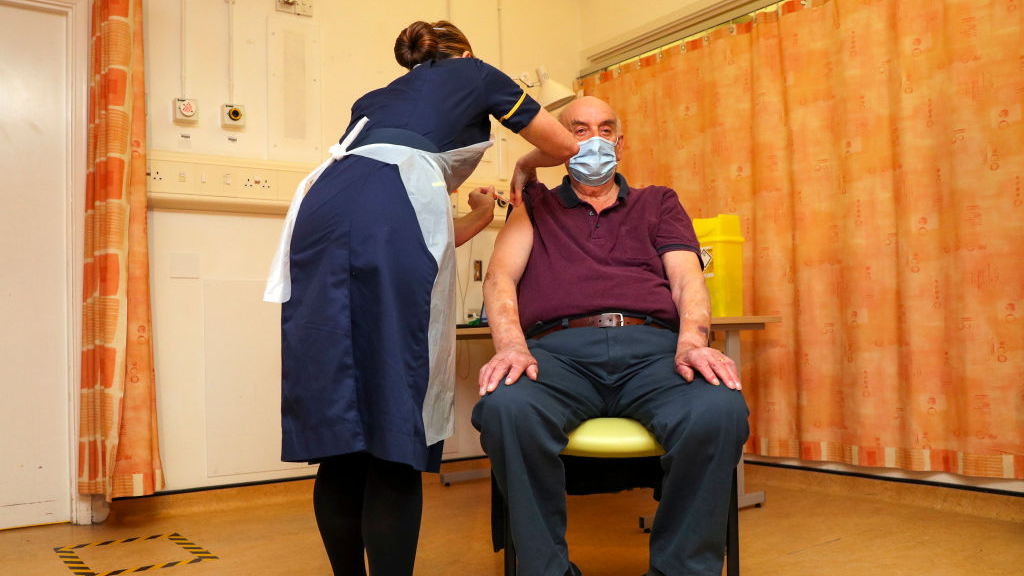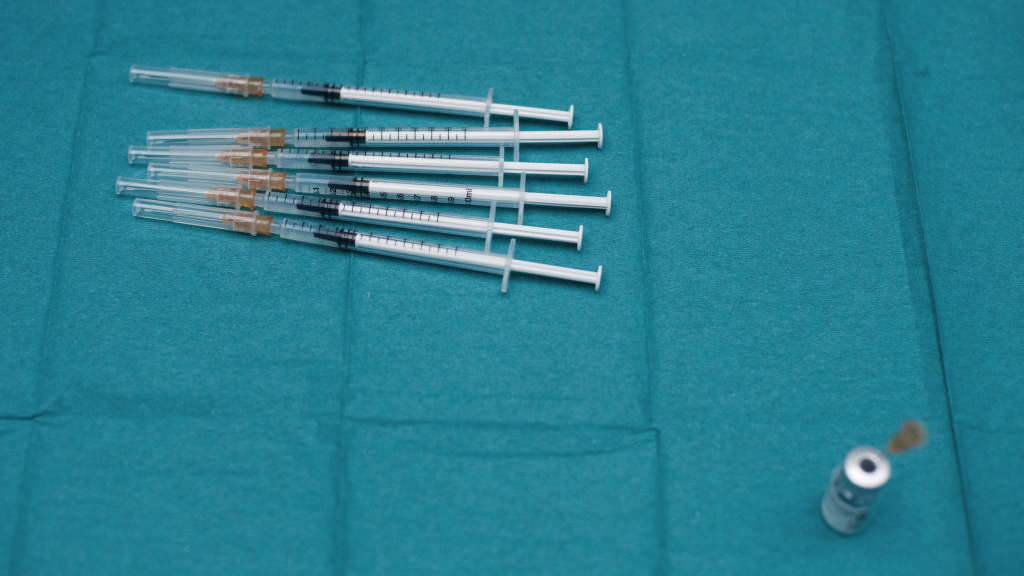
Brian Pinker receives the Oxford University/AstraZeneca COVID-19 vaccine at the Churchill Hospital in Oxford, January 4, 2021. /Getty
Brian Pinker receives the Oxford University/AstraZeneca COVID-19 vaccine at the Churchill Hospital in Oxford, January 4, 2021. /Getty
Editor's note: Thomas O. Falk is a London-based political analyst and commentator. He holds a Master of Arts in International Relations from the University of Birmingham and specializes in U.S. affairs. The article reflects the author's opinions and not necessarily the views of CGTN.
Brian Pinker's image as the first person to receive AstraZeneca's COVID-19 vaccine confirmed what had been evident over the final quarter in 2020: the UK's vaccine approach is significantly more effective than Europe's.
Unlike the UK, the EU had deliberately decided against an emergency approval for AstraZeneca's vaccine in December 2020. Instead, Brussels took its time and waited till the previous Friday. Officially, it was the EU's way to tackle omnipresent vaccine skepticism present in many of the 27 member states.
Indeed, research indicates that significantly fewer people are inclined to receive a vaccine shot in some EU countries compared to other regions in the world.
Globally, an average of 73 percent of the 18,500 respondents stated they would get the vaccine. Within the EU, only 54 percent in France, 64 percent in Spain, 65 percent in Italy and 69 percent in Germany share this sentiment. According to Brussels, an approval process that was perceived as superficial at best in the court of public opinion would have exacerbated the reluctance towards the vaccine even further.
But the EU's "delay for caution" approach has been a costly trade-off. While Brussels curtailed itself in its ability to secure vaccines together to prevent a price war within the bloc while exhibiting extra rigor in its approval process, the UK conducted negotiations with manufacturers on the global market in the crucial phase last spring and during summer. By mid-August, Britain had signed agreements with AstraZeneca, Pfizer/BioNtech, Valneva, GSK/Sanofi, Novavax and Johnson & Johnson's Janssen. It laid the foundation for a rapid and successful vaccine rollout.
The contrasting results to date are staggering. More than 7.8 million Brits have received their first dose. Out of 100 people, 11.2 have been vaccinated – one of the world's highest rates. The EU's rate is 2.3.

Syringes and a vial of the COVID-19 vaccine, produced by Pfizer Inc. and BioNTech SE, at the Cent Quatre cultural center in Paris, France, January 28, 2021. /Getty
Syringes and a vial of the COVID-19 vaccine, produced by Pfizer Inc. and BioNTech SE, at the Cent Quatre cultural center in Paris, France, January 28, 2021. /Getty
Even more concerning for the EU, it will initially only receive one-quarter of the 100 million doses it had expected from AstraZeneca by the end of March – a circumstance which might put millions of European lives in jeopardy. Pfizer's and Moderna will also deliver fewer doses than promised.
And while the EU still argues whether and when the vaccines will be accessible, the UK is pushing the envelope even further by considering an extension of the time interval between the first and second dose to three months to vaccinate even more people.
Despite its apparent shortcomings, European Commission President Ursula von der Leyen continued to claim the right choices were made: "I am deeply convinced that this European path is the right one, and I believe that in retrospect it will prove itself."
Her words and Europe's vaccine-status quo are an advertisement for Brexit and all its supporters. While there was and is lots to criticize about the UK's COVID-19 crisis management – 100,000 deaths are a burden one can hardly ignore – it has shown its ability to set itself apart from a slow-acting, bureaucratic and protectionist European Union, which places the blame for mishaps anywhere but on itself.
The EU will have to bear the consequences of its decision-making. However, what one can and must expect is for Brussels to draw the right lessons from this vaccine fiasco. The most important is to increase pace and determination in future negotiations with the pharmaceutical players.
(If you want to contribute and have specific expertise, please contact us at opinions@cgtn.com.)

